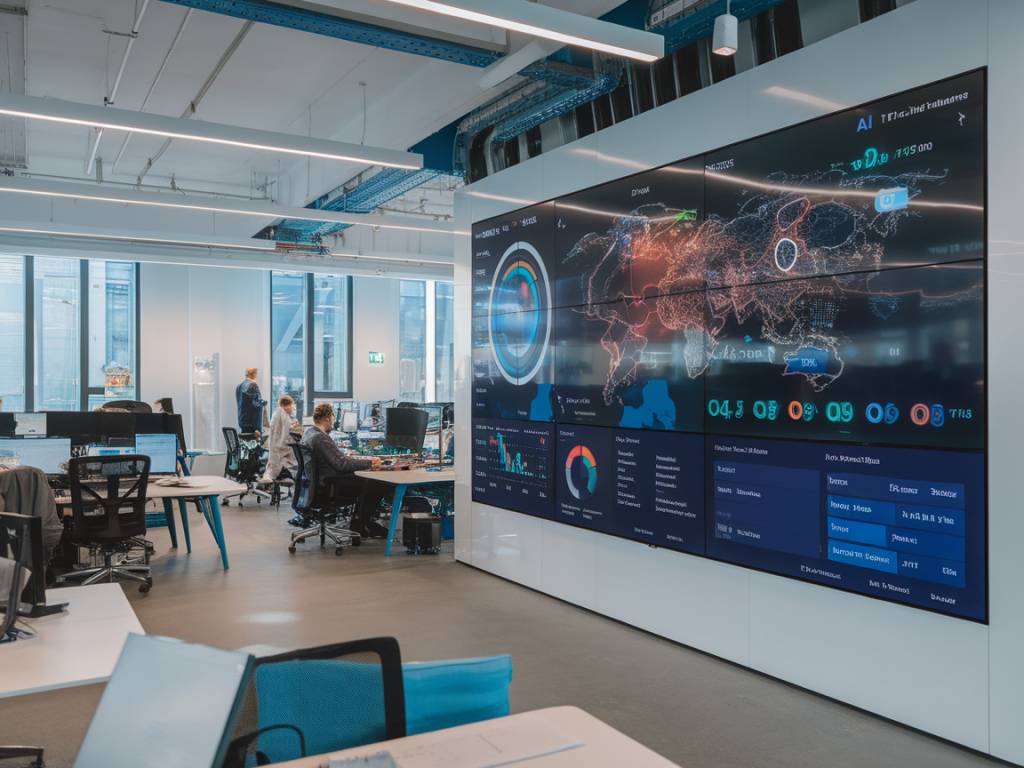The integration of Artificial Intelligence (AI) into supply chain management has revolutionized various aspects of logistics, particularly in enhancing real-time visibility. This advancement not only streamlines operations but also optimizes decision-making, reduces costs, and improves overall efficiency. In this article, we will explore how AI impacts real-time supply chain visibility, the challenges it addresses, and the benefits companies can expect from adopting AI-powered solutions.
Understanding Real-Time Supply Chain Visibility
Real-time supply chain visibility refers to the ability to track and monitor all components of the supply chain as they move from the supplier to the end customer. This visibility encompasses inventory levels, transportation status, and delivery schedules. The goal is to have a transparent and accurate view of the entire supply chain to enable proactive management and swift responses to any disruptions.
The Role of AI in Enhancing Visibility
Artificial Intelligence plays a crucial role in enhancing real-time visibility by processing vast amounts of data quickly and accurately. AI algorithms analyze data from various sources such as IoT devices, GPS tracking systems, and enterprise resource planning (ERP) solutions. By integrating these data points, AI can provide a comprehensive view of the supply chain and predict potential issues before they become significant problems.
Data Collection and Analysis
One of the significant benefits of AI is its ability to collect data from disparate sources and analyze it in real-time. This includes data from sensors, RFID tags, and telematics. By compiling this information, AI can offer actionable insights and identify patterns that would be impossible to detect manually.
- Enhanced demand forecasting: AI can predict customer demand by analyzing historical data and external factors such as market trends and seasonal variations.
- Predictive maintenance: By monitoring equipment in real-time, AI can forecast potential failures and schedule maintenance before breakdowns occur.
- Route optimization: AI algorithms can determine the most efficient routes for transportation, reducing delays and lowering fuel costs.
Improving Inventory Management
AI-powered systems can significantly improve inventory management by providing accurate forecasts and real-time updates on stock levels. This ensures that companies maintain optimal inventory levels, preventing both overstocking and stockouts.
- Automated replenishment: AI can automate the reordering process by predicting when inventory levels will drop below a certain threshold, ensuring that stock levels are always sufficient.
- Waste reduction: With better forecasting and inventory tracking, AI can help reduce waste by minimizing excess inventory and ensuring that products are used before they expire.
- Increased efficiency: Real-time inventory visibility allows companies to streamline their operations, reducing the time and cost associated with manual inventory checks and reconciliations.
Enhancing Supplier Collaboration
AI can also improve collaboration with suppliers by providing a shared platform for real-time data exchange. This transparency fosters better communication and allows all parties to make informed decisions.
- Early warning systems: AI can alert suppliers and manufacturers to potential disruptions, allowing them to take proactive measures to mitigate risks.
- Supplier performance monitoring: By analyzing data on supplier performance, AI can identify areas for improvement and help companies build stronger relationships with their suppliers.
- Collaborative planning: AI enables more effective collaboration on production schedules and demand forecasts, ensuring that all parties are aligned and working towards common goals.
Enhancing Customer Experience
AI-driven real-time visibility can also improve the customer experience by providing accurate and timely information on order status and delivery times. This transparency helps build trust and satisfaction among customers.
- Accurate delivery estimates: AI can provide customers with precise delivery estimates by analyzing real-time data on transportation and logistics.
- Proactive issue resolution: AI can identify potential delays or issues in the supply chain and notify customers in advance, allowing them to make alternative arrangements if necessary.
- Personalized experiences: By analyzing customer data, AI can offer personalized recommendations and tailored experiences, increasing customer loyalty and satisfaction.
Addressing Challenges in Supply Chain Management
Supply chain management is fraught with challenges such as disruptions, inefficiencies, and lack of visibility. AI addresses these challenges by providing a holistic view of the supply chain and enabling proactive management.
- Disruption management: AI can predict and identify potential disruptions, allowing companies to take proactive measures to mitigate risks and maintain continuity.
- Efficiency improvements: AI can streamline processes and reduce inefficiencies by automating routine tasks and optimizing operations.
- Enhanced visibility: AI provides comprehensive and real-time visibility into the supply chain, enabling companies to make informed decisions and respond quickly to changing conditions.
Future of AI in Supply Chain Visibility
The future of AI in supply chain visibility looks promising, with advancements in technology expected to bring even greater benefits. As AI algorithms become more sophisticated and data sources more diverse, companies can expect even more accurate predictions and insights.
- Advanced analytics: Future AI solutions will leverage advanced analytics and machine learning techniques to provide even more detailed insights and predictions.
- IoT integration: The integration of IoT devices will provide even more data points for AI to analyze, further enhancing real-time visibility.
- Blockchain technology: Combining AI with blockchain technology can provide a secure and transparent platform for tracking and verifying transactions, improving trust and collaboration across the supply chain.
In conclusion, the impact of AI on real-time supply chain visibility is transformative. By providing accurate and comprehensive insights into the supply chain, AI enables companies to optimize their operations, improve efficiency, and deliver better customer experiences. As technology continues to advance, the role of AI in supply chain management will only grow, offering even greater opportunities for innovation and improvement.



